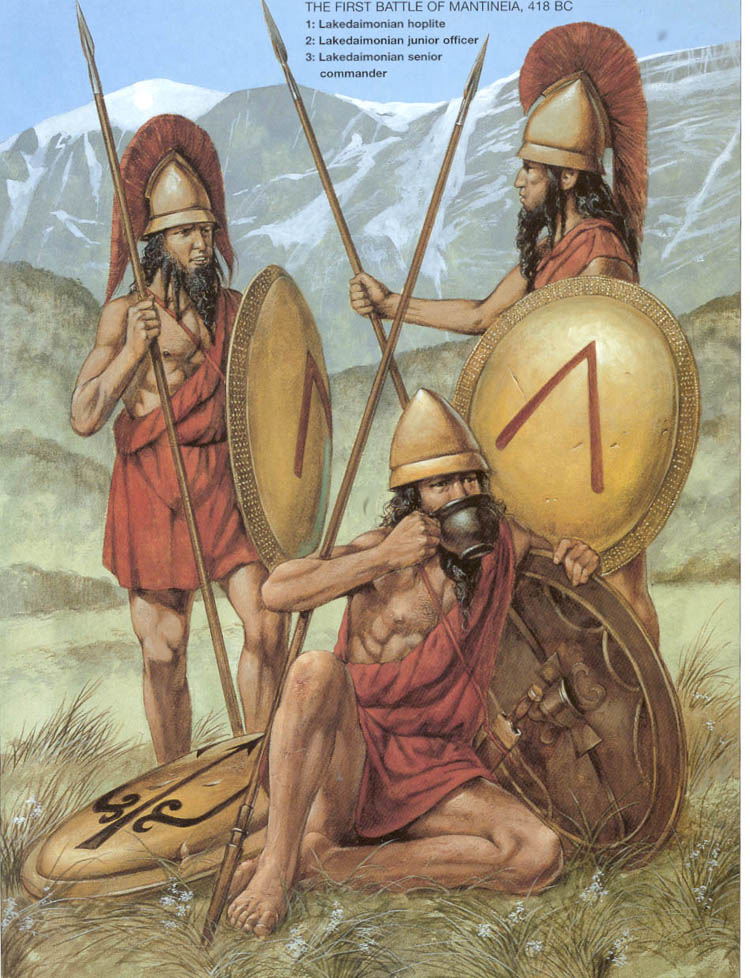






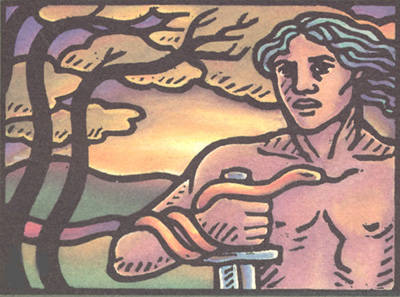


Man2Man in the Middle East
2-2-10
Intro Note from Bill Weintraub
Guys,
This letter from our always excellent and very insightful Warrior Redd --
is based upon concepts we discuss in Sex Between Men: An Activity, Not a Condition.
If you haven't yet read Sex Between Men: An Activity, Not a Condition, I strongly encourage you to read that article before you read Redd's post.
Sex Between Men: An Activity, Not a Condition.
Please be sure to read it.
Here's Warrior Redd:


Man2Man in the Mid East
2-1-10
Last month I attended a lecture by a Lebanese historian who is a professor at a university. His lecture traced the history of the Middle East, and he noted that his focus was on gender.
When he broached gay, a string of questions followed. He cited a Muslim intellecutal who rejected "gay" to describe man2man in Arab cultures, saying that homosexual experiences in Arab cultures happened, which most people in those respective cultures knew, but the men usually married.
"Gay," the intellectual reasoned, was a condition, but Arab homosexual experiences were activities. For him, "gay" was a lifestyle, like a castrated man with a distorted view of himself as a woman. The Arab "homosexual" (the word used in the lecture) did not relinquish his masculinity when he engaged in sexual activity with a man. The activity didn't make the Arab man think/feel that he was a woman, "gay."
Also, the lecturer suggested that because Arabs knew about Arab men's man2man, no one thought much of it or did not see man2man negatively or as men acting like women.
I think his use of "homosexual" to describe Arab man2man appropriates the meaning soiled by the Western gay establishment. Your term "man2man" better supports the lecturer's and the intellectual's concept of Arab man2man. Sadly, though, the lecturer discusses man2man using "gay" and "homosexual" to describe what those terms don't denote.
Redd
Also by Warrior Redd:
Our Lives, our Fortunes, and our sacred Honor
Heterosexism's encroachment on masculinity
Heterosexism's control over masculinity
To see masculinity and masculine love as sacred
Plus replies to many, many posts on our Man2Man Alliance Personal Stories message board.
Re: Man2Man in the Middle East
2-2-10
Thank you Redd.
As always, your thoughts are excellent.
And guys, interestingly, there's an interview with Gore Vidal in the Independent, a UK journal -- an interview which touches on these matters.
This interview is not for the faint of heart.
Vidal is old, he's bitter, and he's very "anti-American."
But in the interview, after setting out his sad history of love and loss, he repeats what he's often said about sexual orientation:
...
So homosexuality and heterosexuality are fictions? "Yes, of course." He adopts a camp voice and adds: "But it makes a lot of girls happy." Why do so many people believe it to be true about themselves if it's false? "They believe in Jesus, and that's a much bigger fiction, with more money spent on it. Prettier clothes too."
You'll notice -- and it tells us a lot about the majority culture -- that Vidal's interviewer thinks his views are "strange"; and asks, if "homosexuality and heterosexuality are fictions," "why do so many people believe it to be true about themselves?"
Vidal's response is to attack Christianity, which of course some will find offensive.
But he's correct that people have, historically, believed in many culturally-dictated fictions.
For example the geocentric theory of the universe:
For thousands of years people believed that the earth was at the center of the universe, and that everything, including the sun, circled the earth.
Of course that's not true, and very few people today believe it.
Similarly, for thousands of years people believed there was a divinity in the form of a man who lived beneath the sea and caused earthquakes.
He was Poseidon to the Greeks, Neptune to the Romans.
But no one today believes in him.
So what people believe changes over time.
And Vidal is correct to point to the Roman emperors, almost all of whom had both wives and boyfriends.
As he says,
And that's, generally speaking, correct:
"there was no differentiation between same-sexers and other-sexers"
As we would put it -- for the ancients, sex, whether between man and man or man and woman was an activity -- not a condition.
For a gentler, but truly excellent, exploration of Vidal's views on sex and love between men, please read Warrior Logan McClintock's The Anal Sex Myth: A Frottage Manifesto, on this Man2Man Alliance site.
So -- to get back to Redd -- Vidal is, basically, making the same point as Redd is making.
And guys, this is the crux of what Redd's saying:
I think [the lecturer's] use of "homosexual" to describe Arab man2man appropriates the meaning soiled by the Western gay establishment. Your term "man2man" better supports the lecturer's and the intellectual's concept of Arab man2man. Sadly, though, the lecturer discusses man2man using "gay" and "homosexual" to describe what those terms don't denote.
Exactly.
The lecturer is using the Western terms of "gay" and "homosexual" to, as Redd says, "describe what those terms don't denote."
"Gay" and "homosexual" denote a condition.
What the lecturer is describing is something which, in his culture, is a normal male activity:
Guys having sex with Guys -- Man2Man.
In the lecturer's own culture, such terms aren't -- or at least shouldn't be -- necessary.
Because
Arabs knew about Arab men's man2man, no one thought much of it or did not see man2man negatively or as men acting like women.
Once again, Man2Man in that culture is just an activity -- it's not a condition.
But, and over time, that concept of Man2Man is being corrupted by an overlay of the Western concepts of "homosexuality" and sexual orientation -- both of them conditions.
As the lecturer says,
And, we need to be clear, "gay" isn't simply a condition, it's a *Western* condition and concept, which is being imposed on traditional cultures like those of the Middle East.
And it's not just the concept of "gay."
Recently, there was an article in the NY Times about how Western
definitions of mental illness are being imposed on cultures in which different definitions have prevailed for centuries.
So it isn't just about same-sex and Man2Man -- the West, because of its vast technological and financial power, tends to impose itself culturally in many areas.
And that cultural imposition is often destructive -- as Redd says:
The lecturer is using terms which have been "soiled by the Western gay establishment."
Soiled in so many different ways that they've become useless to describe anyone except -- people who are part of or ardently support that same establishment -- the analists.
So: Those terms need to be tossed out.
Because, clearly, people would be far better off if they just used terms like "same-sex" or "male-male" -- or "man2man."
You can see that when we take eminent classicist KJ Dover's statements in his introduction to Plato's Symposium -- which I discuss in Sex Between Men: An Activity, Not a Condition -- and alter the language:
Here's Dover's version:
[The Greeks] did not consider homosexual relations incompatible
with concurrent heterosexual relations or with marriage...
Here's Bill Weintraub's version:
[The Greeks] did not consider male-male relations incompatible with
concurrent male-female relations or with marriage...
All you have to do is eliminate those very loaded words, "homosexual," "heterosexual," "gay," and "straight" -- and you're in a much better
and certainly far more objective place.
Redd:
Your term "man2man" better supports the lecturer's and the intellectual's concept of Arab man2man.
Right.
Or, so far as I'm concerned, "male-male" or "same-sex."
Because then it's just an activity.
And, it should be said, that sense of man2man -- as a normal and natural male activity -- is not limited to Arabs.
The Pashtun, for example, I've been told, are the same.
As best I can tell, throughout Northern Africa and the Middle East,
and into South Asia -- a vast swath of land -- same-sex sex between
Men is, as we say, just an activity -- it's not a condition.
Which was also true in the US for most of the nineteenth century.
As we discuss in Warriorhood and Male Intimacy.
And as is illustrated quite literally in Prof Ibson's book, and very persuasively too.
Which brings us back to Redd's crucial point.
Very well-said, and thank you again Redd.
You're a true Warrior.
Bill Weintraub
Now guys, let's look at this not just cross-culturally, but historically.
Which we can because there were ancient Greek city-states in the Middle East, primarily on the coast of Asia Minor, in what is now Turkey and Syria.
And you see some of them on this map, in places with names like Phyrgia, Lydia and Caria:
Strangely, though, Vidal has always resisted the idea that he is a "gay" champion. "I never said I was gay, because I don't think anyone is." He says he finds "these restrictions tiresome. In the centuries of Rome's great military and political success, there was no differentiation between same-sexers and other-sexers; there was also a lot of crossing back and forth. Of the first 12 Roman emperors, only one was exclusively heterosexual."
there was no differentiation between same-sexers and other-sexers; there was also a lot of crossing back and forth.
"Gay," the intellectual reasoned, was a condition, but Arab homosexual [meaning same-sex sexual] experiences were activities.
I think the lecturer's use of "homosexual" to describe Arab man2man appropriates the meaning soiled by the Western gay establishment.
Wherever and whenever the homosexual ethos of the Greek world
originated, the simple answer to the question 'Why were the Athenians
of Plato's time so fond of homosexual relations?' is "Because
their fathers and grandfathers were'.
Wherever and whenever the emphasis on same-sex love -- that is, Eros
-- in the Greek world originated, the simple answer to the question
'Why were the Athenians of Plato's time so fond of male-male
relations?' is "Because their fathers and grandfathers were'.
I think the lecturer's use of "homosexual" to describe Arab man2man appropriates the meaning soiled by the Western gay establishment. Your term "man2man" better supports the lecturer's and the intellectual's concept of Arab man2man. Sadly, though, the lecturer discusses man2man using "gay" and "homosexual" to describe what those terms don't denote.
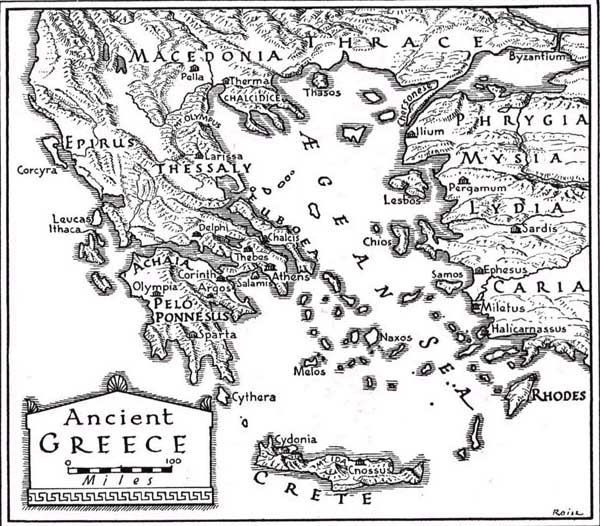
There's Ephesus, for example.
Heracleitus, the pre-Socratic philosopher, was from Ephesus.
Which at one time was a large and very rich city-state.
Those city-states fell, quite naturally, under the sway of the Persian Empire.
And they weren't happy there.
After the Greeks repulsed the Persian attempt to invade Greece itself -- which we talk about in the 300 message thread -- the Greeks attempted, on various occasions and in various ways, to liberate their fellow Greeks who were trapped on the mainland of what the Greeks called "Asia."
And we're going to talk about just a few incidents, dating from roughly 400 BC to 395 BC, and recounted by the Greek author Xenophon -- incidents related to those attempts to liberate the Greek cities of Ionia.
Now:
Xenophon, whom we've discussed before, was an Athenian aristocrat turned mercenary who at that time -- and henceforward -- was working for the Spartans, and in particular a Spartan king named Agesilaus, who he really liked.
And who really liked him.
They were good buddies, and it's conceivable to me that they were lovers, though not necessarily -- they may have just been good friends.
Here's how the great classicist Werner Jaeger describes Xenophon and his life:
Xenophon, in spite of his homely respectability [as an author], was not merely an average man of his age -- the 'man in the street'. He was an individual in his own right. He had his own strange destiny, arising logically out of his nature and his relation to his environment. He was born in the same Attic deme [Athenian township] as [the philosopher] Isocrates, and had the same unhappy experiences as Isocrates and Plato during the last decade of the Peloponnesian War, while he was growing to manhood. Like many young men of his generation, he was attracted to Socrates; and although he was not strictly a pupil of Socrates, the old man made such a deep impression on him that in later life, after he returned from his Persian expedition, he made more than one lasting memorial to him in his books. But it was not Socrates that moulded his fate. It was his own burning ambition for adventure and for war, which drew him to the young [Persian] prince Cyrus, that romantic rebel, and made him join the mercenary army fighting under his banner. This enterprise, which he described in his most colorful book, the Anabasis or Expedition of Cyrus, brought him suspiciously close to Spartan political influences, and he was compelled to pay with banishment for the inestimable military, ethnological, and geographical experience he had gained on the Asiatic campaign. In the Anabasis he tells of the estate the Spartans gave him at Scillus, in the farming country of Elis in the northwest of the Peloponnese. It became his second home. He stayed there for many peaceful years, living as a gentleman farmer and writing books. His love for the varied life of the farmer is as strong a characteristic of his nature as his memory of Socrates and his interest in history and in soldiering; and, like them, it is an important element in his writing. His bitter political experience with the democracy of his own Athens impelled him to go over to Sparta. His increased knowledge of the leading men and the internal structure of Sparta (then the almost unchallenged leader of Greece) led him to write his essay The Lacedaimonian Constitution and his eulogy of [his good friend, King] Agesilaus. But his 'Greek History,' usually known as the Hellenica, marked a widening of his interest to take in the whole of contemporary history; and his 'Education of Cyrus', or Cyropaedia, reflected the impression made on him by Persia. During the period when Athens, with her second naval confederacy, was regaining some of her old power, Xenophon still remained far from home. He did not return till after the fall of the League, which had been the last great political achievement of Athens; and then he attempted to play his part in the reconstruction of the army and the Athenian economy with a few practical essays on a small scale. Not long after the end of the Social War (355) we lose sight of Xenophon. He was over 70 by then, and may not have lived much longer. His birth and death, therefore, coincided fairly closely with Plato's [who lived from 427 to 346 BC].
So -- what you can see is that Xenophon was an Athenian and a contemporary of Plato's.
And who ended up living in Sparta.
Now -- remember these quotes from another classicist, KJ Dover, about Plato's Athens and same-sex love or Eros -- in Bill Weintraub's version:
Wherever and whenever the emphasis on same-sex love -- that is, Eros -- in the Greek world originated, the simple answer to the question 'Why were the Athenians of Plato's time so fond of male-male relations?' is 'Because their fathers and grandfathers were'.[The Greeks] did not consider male-male relations incompatible with concurrent male-female relations or with marriage...
So -- Xenophon -- like Plato -- grew up in a place in which Men were "fond of male-male relations."
Why?
'Because their fathers and grandfathers were'.
What's more, those same Men "did not consider male-male relations incompatible with concurrent male-female relations or with marriage..."
Why not?
Because to them, Eros was an ACTIVITY -- not a condition.
Now -- was the practice of male Eros limited to the Athenians?
Of course not.
The Spartans were just as enamoured of it.
Look at the map:

These cities were not far from each other.
And they shared the same culture.
So -- and as you'll see, we can take Dover's words about Plato and the Athenians, and apply them to the Spartans -- and Xenophon, the pro-Spartan Athenian who spent most of his adult life in or about Sparta:
'Why were the Spartans of Xenophon's time so fond of male-male relations?'
'Because their fathers and grandfathers were'.
The Spartans did not consider male-male relations incompatible with concurrent male-female relations or with marriage...
And here's the kicker, folks:
As you're about to see, the Persians of Asia Minor, who'd been under Greek cultural influence for many many years, "did not consider male-male relations incompatible with concurrent male-female relations or with marriage" either.
They were all into it.
Greeks, Persians, Spartans, Athenians etc -- they all thought male-male love affairs were the cat's pjs.
And in no way incompatible with "male-female relations" or any other aspect of a Man's life.
Eros was a male activity.
Something that was fun, and exciting, and enriching.
And which in no way made a Man -- less than a Man.
Unless, of course, he did anal.
That was another story.
Because we're talking about a world in which Warrior values, which center on Virtue, Valour, and Community -- rather than mercantile or commercial or consumerist values, which center on greed and self -- prevailed.
Again, in Warrior cultures, Virtue, Valour, and Community are valued, while greed and self -- are denigrated.
As you'll see.
Now, as Jaeger says, Xenophon had a lot of "knowledge of the leading men and the internal structure of Sparta" -- and wrote about them.
Indeed, if it were not for Xenophon, there are a great many things which we would simply not know about Sparta.
Take this paragraph, for example, from Xenophon's Hellenica or Greek History, which is actually just a history of Xenophon's times and experiences between 411 and 362 BC.
The context is that Sparta has suffered a military reverse, and needs to do something about it.
When the Spartans heard what had happened they decided, after they had discussed the matter, that a large force ought to be sent out so as to put an end to the pride of the victors ... Once the decision was made, they sent out King Agesipolis as commander and gave him, as they had given [his fellow king] Agesilaus when he was in Asia, a staff of thirty Spartans of the officer class. Many of the better class Perioeci, too, went with him as volunteers; also aliens belonging to the so-called 'Spartan-trained'; also bastard sons of Spartan officers, a very fine-looking body of men, and one well-acquainted with the ideals of the city.~translated by Rex Warner
So -- first of all we learn that there were two Spartan kings ruling simultaneously -- in this case, Agesipolis and Agesilaus -- the latter being Xenophon's friend.
Now, that's something we'd have known from other historians as well as Xenophon; but Xenophon gives us the clearest picture of how the dual-kingship worked in practice.
Then we learn that Agesipolis was given thirty "Spartans of the officer class."
Those are the Spartiatai -- singular Spartiates -- the full-blooded Spartan Peers or Equals, each of whom receives a plot of land, a kleros, at birth, and who goes through the Agogé.
They are, in short, and have been raised to be since birth, professional soldiers -- and they have full citizenship rights.
They can vote in the Assembly, they're entitled to what we'd call due process of law if accused of a crime -- they're fully-empowered Spartan citizens.
Then there are volunteers from the "better class Perioeci".
The "Perioeci" are the "dwellers around" -- people who lack Spartan citizenship but who are allowed to live in or around Sparta because they provide a needed service -- such as a merchant or artisan might.
And we learn that those Perioeci can volunteer and fight alongside Spartans.
Then there are "aliens belonging to the so-called Spartan-trained";
"Alien" of course means non-Spartan, and among those 'Spartan-trained' aliens were Xenophon's own sons.
Xenophon thought so highly of Sparta and in particular the Agogé that he sent his own sons to be raised, educated, and trained in Sparta.
As did many others in the pro-Spartan camp throughout Greece.
Finally, there are the "bastard sons of Spartan officers, a very fine-looking body of men, and one well-acquainted with the ideals of the city."
And if they're well-acquainted with the ideals of the city -- that suggests that they've gone through the Agogé too.
But they're "bastards" -- they're not Spartiatai.
Their fathers are Spartiatai.
Who were their mothers?
We're not told.
And guys, I'm operating under a big handicap because I don't have a Greek copy of the Hellenica.
So I don't what word Rex Warner is translating as "bastard."
Just as I don't know what word he's translating as "Spartan-trained."
But it matters, particularly in the case of "bastard," because the Spartans, according to Plutarch, had, at least in earlier times, practiced forms of what we might call group-marriage -- all in the service of the Spartan eugenic program, as devised by the Spartan law-giver, Lycurgus:
After making marriage as modest and orderly as this, Lycurgus showed equal concern for removing absurd, unmanly jealousy. While excluding from marriage any kind of outrageous and disorderly behaviour, he made it honourable for worthy men to share children and their production, and derided people who hold that there can be no combination or sharing of such things, and who avenge any by assassinations and wars. Thus if an older man with a young wife should take a liking to one of the fair and valorous young men and approve of him, he might well introduce him to her so as to fill her with noble sperm and then adopt the child as his own. Conversely a respectable man who admired someone else's wife noted for her lovely children and her good sense, might gain the husband's permission to sleep with her -- thereby planting in fruitful soil, so to speak, and producing fine children who would be linked to fine ancestors by blood and family.
First and foremost Lycurgus considered children to belong not privately to their fathers, but jointly to the city, so that he wanted citizens produced not from random partners, but from the best. Moreover he observed a good deal of stupidity and humbug in others' rules on these matters. Such people have their bitches and mares mounted by the finest dogs and stallions whose owners they can prevail upon for a favour or fee. But their wives they lock up and guard, claiming the right to produce their children exclusively, even though they may be imbeciles, or past their prime, or diseased. They forget that where children are born of poor stock, the first to suffer from their poor condition are those who possess and rear them, while the same applies conversely to the good qualities of those from sound stock. What was thus practised in the interests of breeding and of the state was at that time so far removed from the laxity for which the women later became notorious, that there was absolutely no notion of adultery among them. There is a story recorded about Geradas, a Spartiates of really ancient times, who when asked by a foreigner what their punishment for adulterers was, said: 'There is no adulterer among us, stranger.' When the latter replied: 'But what if there should be one?', Geradas' answer was: 'His fine would be a great bull which bends over Mount Taygetus to drink from the Eurotas. ' The foreigner was amazed at this and said: 'But how could there be a bull of such size?' At which Geradas laughed and said: 'But how could there be an adulterer at Sparta?'
The father of a newborn child was not entitled to make his own decision about whether to rear it, but brought it in his arms to a particular spot termed a lesche where the eldest men of his tribe sat. If after examination the baby proved well-built and sturdy they instructed the father to bring it up, and assigned it one of the 9,000 lots of land.
"it [was] honourable for worthy men to share children and their production" -- by, basically, sharing wives.
"Thus if an older man with a young wife should take a liking to one of the fair and valorous young men and approve of him, he might well introduce him to her so as to fill her with noble sperm and then adopt the child as his own. Conversely a respectable man who admired someone else's wife noted for her lovely children and her good sense, might gain the husband's permission to sleep with her -- thereby planting in fruitful soil, so to speak, and producing fine children who would be linked to fine ancestors by blood and family."
So -- it's possible that the children being referred to as "bastards" are the result of this sort of conscious breeding.
Which would explain why Xenophon describes them as "a very fine-looking body of men."
But -- Plutarch suggests that such children would be adopted by the husband of the woman who'd been impregnated.
In which case, would they still be considered "illegitimate" or "bastards?"
I don't know.
What I need to know is what the word is in Greek.
Why, by the way, does Xenophon not explain something like this more clearly?
Because he was writing for his own peers -- people who would know without being told.
So he often leaves out details which, as a consequence -- leave us mystified.
But what's clear is that Spartiatai -- at least good-looking and virtuous Spartiatai -- did not lack access to women other than their wives.
And not only did they not lack that access, but they had enough access to generate an entire company of young men, and "a very fine-looking body of men, and one well-acquainted with the ideals of the city."
So -- those are the sorts of details which Xenophon provides, details which without him would be totally unknown, since no other writer, at least whose work survived, had the sort of experience and knowledge of Sparta that he did.
Xenophon was uniquely placed to report on Sparta, and he did.
Which takes us back to the Middle East.
Because, as Jaeger explained, early in his life Xenophon had joined a Greek mercenary force of 10,000 hoplites recruited by a Persian prince, Cyrus, to overthrow his brother, the king of Persia.
The mercenary force marched deep into Persia, fought a battle and won it, but Cyrus was killed.
The Greeks then found themselves stranded deep in enemy territory.
Through a ruse, the Persians managed to kill the Greek leaders.
At which point the Greeks held an Assembly and *elected* Xenophon to lead them out of Persia and back to Greece.
Which he did.
But not without much hardship -- and fighting.
Nevertheless, 8,000 of the 10,000 made it back to Greek territory.
And, as Jaeger says, that Asiatic campaign gave him "inestimable military, ethnological, and geographical experience" -- which the Spartans -- and specifically Agesilaus -- recognized as intrinsically and uniquely valuable.
Agesilaus, you see, wanted to conquer Persia.
And who better to take with him than Xenophon, who knew Persia very well, and as a soldier.
So -- in the years immediately following his return from Persia, we find Xenophon in Asia Minor with Agesilaus, thirty "Spartans of the officer class," and an army -- including, and no surprise here, the 8,000 mercenaries who'd made it back from Persia.
When Xenophon and the 8,000 had first shown up back in Greek territory, at a Greek city on the Hellespont called Byzantion, a Greek city which just happened to have a Spartan governor, some of the Spartans thought they should be killed.
They were, after all, a big, heavily armed, mercenary force.
And to the Spartans, they looked like a bunch of toughs.
But Agesilaus said -- Hold on.
He had a ship take him to Byzantion, checked out Xenophon and the mercenaries, and concluded pretty quickly that both could be of great use.
So -- Agesilaus and his army are now on Persian territory, and, in addition to fighting battles, Agesilaus is attempting to gain allies by luring various local Persian officials and minor kings away from the local Persian governor, the satrap.
Now earlier, Xenophon has told us that a local Persian official had killed his mother-in-law and her son, "a remarkably good-looking boy of about seventeen."
And that's one of the interesting things about Xenophon --
He doesn't hesitate to comment on the physical appearance of other Men.
In ways that suggest a sexual interest.
Xenophon, like most Greek Men, did marry, thought very highly of his wife, and had children.
But he doesn't hesitate to comment on the physical attractiveness -- of guys.
Because, clearly, he doesn't think that doing so will trap him in some sort of box or condition.
It's just a normal part of being a Man.
In this vignette, we find Agesilaus doing the same thing -- commenting on how good-looking a young man is.
And the context is that he's trying to cement an alliance with a local king, named Otys -- to whom he's been introduced by a renegade Persian named Sphithridates:
Agesilaus, after asking Sphithridates to withdraw, began the conversation in the presence of the thirty Spartan officers.'Tell me, Otys, what sort of family does Sphithridates come from?'
'As good as any in Persia,' replied Otys.
'Have you noticed,' said Agesilaus, 'what a very good-looking son he has?'
'Indeed I have,' said Otys. 'As a matter of fact, I dined with him yesterday.'
'They say,' said Agesilaus, 'that his daughter is even better-looking.'
'By Zeus,' said Otys, "she certainly is a very beautiful woman.'
'Well,' said Agesilaus, 'now that you've become my friend, may I give you my advice? I should advise you to marry the girl. She's very beautiful, and what can be nicer for a husband than that? Her father comes from an excellent family, and had such authority that when he was injured by [the satrap] Pharnabazus, he was able to avenge himself. ... And I think you can be sure that he's just as capable of doing good to a friend as he is of avenging himself on his enemy Pharnabazus. There's another point too. If this arrangement is made, you will not only be connected with Sphithridates but with me and the other Spartans, and since it is we who control Greece, with the rest of Greece as well.' ...
So -- what you see here is that Agesilaus doesn't hesitate, when talking to a fellow king, to remark upon the good looks of someone else's son.
And then make a connection between the son's attractiveness and the daughter's attractiveness.
It's all very natural.
If you think the son's good-looking, wait till you see the daughter.
Now: the sub-text here is that Agesilaus was himself in love with the son, whose name was Megabates.
We know that because Xenophon tells us so in a sort of eulogy to Agesilaus Xenophon wrote after his death.
In it, he praises Agesilaus in terms of the Divine Virtues, which for Xenophon are five: Piety, Justice, Self-control, Courage, and Wisdom.
And he gives examples of Agesilaus' virtuous behavior in each category.
When he gets to self-control, he relates this anecdote:
His habitual control of his affections [or lusts] surely deserves a tribute of admiration, if worthy of mention on no other grounds. That he should keep at arms' length those whose intimacy he did not desire may be thought only human. But he loved [or was the lover of] Megabates, the handsome son of Sphithridates, with all the intensity of an ardent nature. Now it is the custom among the Persians to bestow a kiss on those whom they honour. Yet when Megabates attempted to kiss him [in public], Agesilaus resisted his advances with all his might -- an act of punctilious moderation surely!Megabates, feeling himself slighted, tried no more to kiss him, and Agesilaus approached one of his companions with a request that he would persuade Megabates to show him honour once again. "Will you kiss him," asked his companion, "if Megabates yields?" After a deep silence, Agesilaus gave his reply: "By the twin gods, no, not if I were straightway to be the fairest and strongest and fleetest man on earth! By all the gods I swear that I would rather fight that same battle over again than that everything I see should turn into gold!"
~translated by Marchant
I think Marchant has fudged a bit on the translation -- which dates back to 1925 -- but what's clear is that Agesilaus was Megabates' lover -- and was very much in love:
he loved Megabates, the handsome son of Sphithridates, with all the intensity of an ardent nature
That's unequivocal.
Agesilaus loved Megabates, a handsome Persian youth, with all the intensity of an ardent nature.
But -- this is one of many instances in which Greek customs and Persian customs disagreed and to the discomfiture of both parties.
The Persians were ashamed to be nude in public, but would kiss another Man publically.
The Greeks were proud to be nude in public, but did not favor public displays of affection.
Those of you who've read Mary Renault's The Nature of Alexander may remember the scene, seventy years after, when a Persian youth has won a dance competition, and Alexander's soldiers start chanting -- to Alexander -- "Give him a kiss, Give him a kiss, Give him a kiss!"
It's a charming anecdote, but not the sort of thing Alexander would want to do in public.
In any event, eventually Agesilaus was forced to return to Greece, and so far as we can see, Megabates was left behind with his father in Persian-controlled Asia.
Now, we don't know for certain how many male love-affairs Agesilaus had, but we know that he had at least two, and perhaps more.
And that his first lover, when he, Agesilaus, was still in the Agogé, was the Spartan Lysander, who eventually became a famous admiral.
At that point, however, he was not yet an admiral.
He was a Spartiates -- a full-blooded Spartan Peer or Equal -- and almost certainly still a very young man.
Just an Equal among Equals.
He was also poor, as Plutarch tells us:
Lysander himself was brought up in poverty and showed himself as amenable as any Spartan to the customs of his country. He proved too that he possessed a manly spirit and was indifferent to all forms of pleasure, except for that kind which honored and successful men earn by their own exploits -- and this, indeed, is the only kind to which it is no disgrace for the young Spartan to yield.~ Life of Lysander, translated by Scott-Kilvert
"he possessed a manly spirit and was indifferent to all forms of pleasure, except for that kind which honored and successful men earn by their own exploits -- and this, indeed, is the only kind to which it is no disgrace for the young Spartan to yield."
What does Plutarch mean by "exploits?"
He means acts of Valour -- of Bravery and Courage -- in the service of Sparta -- acts which the Spartans would consider Virtuous.
So -- the Spartan value system -- "the city's ideals" as Xenophon referred to them -- are Virtue and Valour -- NOT pleasure and NOT greed.
Lysander is described as having a manly spirit and being indifferent to all forms of pleasure -- other than that of Valour.
Now, I said that Lysander would have been a young man.
How old was Agesilaus?
We don't know, but Plutarch describes him as being "in the prime of his youth" -- which would make him an older teen-ager -- perhaps seventeen -- but still in the Agogé.
Here's Plutarch:
it was expected that Agesilaus would spend his life as a private citizen, and he was therefore brought up according to the regular Spartan system of education, which is austere in its way of life, full of hardships, and designed to train young men to obey orders. ... The law exempts the heir-apparent to the throne from the necessity of undergoing this training, and so Agesilaus was exceptional in this respect, namely that by the time he came to rule, he had already been taught to serve. The result was that he was on more harmonious terms with his subjects than any of the other kings of Sparta, because the commanding and regal qualities that he possessed by nature were tempered by a kindliness and a regard for his people which he had acquired through his public training.During the year that he spent in one of the companies [herds] of boys who were brought together under the Spartan system, he had as his lover Lysander, who was especially struck by his natural modesty and discretion. Agesilaus was more aggressive and hot-tempered than his companions. He longed to be first in all things, and he had in him a vehemence and impetuosity which were inexhaustible, and carried him over all obstacles; yet at the same time he was so gentle and ready to obey authority that he did whatever was demanded of him. He acted in this way from a sense of honour, not of fear, and he was far more sensitive to rebuke than to any amount of hardship. He was lame in one leg, but the beauty of his physique in the prime of his youth made the deformity pass almost unnoticed, and the ease and light-heartedness with which he endured it went far to compensate for the disability, since he was the first to joke and make fun of himself on this subject. In fact his lameness served to reveal his ambition even more clearly, since he never allowed it to deter him from any enterprise, however arduous it might turn out.
~ Life of Agesilaus, translated by Scott-Kilvert
So -- Lysander is described as "possessed of a manly spirit."
While Agesilaus is naturally modest and discrete, but also "more aggressive and hot-tempered than his companions."
The point being that from childhood on, these are Men.
Masculine Men.
Naturally Masculine Men.
Who grow up in a world which supports them in their Masculinity.
And that includes in their male-male love affairs.
Now -- was Agesilaus the only Spartan king to show an interest in other guys?
No.
We can assume, based on Dover and Jaeger and Plato and Plutarch and other sources, that all the Spartan kings, and all the Spartiatai, were interested in guys.
Of the three principal Spartan holidays, after all, two -- the Hyakinthia and the Gymnopaidiai or Festival of the Naked Youths -- were about -- guys!

And we know for a fact that Agesilaus' fellow king, Agesipolis, was into guys -- and that the two kings used to bond by discussing their male-male love-affairs.
As Plutarch tells us:
Whenever the kings of Sparta are at home, it is their custom to eat together in the same phidition, or public mess. Agesilaus knew that his colleague was prone to form attachments to boys, just as he was himself, and so he often turned the conversation to the subject of the boys who were of an age to take part in love affairs. He would encourage the young[er] king and even share with him in pursuing these relationships and act as his confidant, for the general view in Sparta is that there is nothing disgraceful in these attachments, but that on the contrary such a love inspires modesty, ambition, and a burning desire to excel, as I have described in my Life of Lycurgus.
That's from Plutarch, who was writing about 400 years later.
Xenophon, who was there and knew both of these Men personally, is even more emphatic about the two kings and their shared love of Eros.
The context is the death of Agesipolis at a comparatively young age while on campaign:
Agesipolis had marched straight on from Macedonia and halted near Olynthus. Then, since no one came out against him, he had laid waste parts of the country which had so far been untouched, and went on to the territory of cities allied with Olynthus, destroying their crops. [This policy of "devastation" was standard operating procedure for all the Greek city-states when at war. The goal was, simply, through destroying the enemy's crops, to starve him into submission.]In the case of Torone, he made an attack on the city and took it by storm. [And in such an attack, Agesipolis would have led his troops personally -- because again, that was standard operating procedure -- Greek generals and kings led their troops into battle.]
In the middle of these operations, at the height of summer, he fell ill with a burning fever. Before then he had seen the shrine of Dionysos at Aphytis and now he felt a longing for its shady arbors and cool limpid waters. So he was carried there still living, but on the seventh day from the beginning of his illness, he died outside the sanctuary. His body was placed in honey and taken back to Sparta, where it was given a royal burial.
One might have expected that Agesilaus, when he heard the news, would have been pleased, as one is at the death of a rival, but in fact he wept and mourned for the loss of a comrade; for, of course, the Spartan kings mess together when they are at Sparta. And in all their conversations about their young days, hunting, horsemanship, or love affairs, Agesipolis was excellent company for Agesilaus. He also treated him, as the older man, with becoming respect in all relations which arose out of their shared quarters. ...
~translated by Warner
So -- Agesilaus and Agesipolis had shared quarters in the city of Sparta itself.
And this is another interesting detail which Xenophon lets drop.
That somewhere within the city of Sparta itself, the Spartiatai had their quarters.
Those of course would have been the communal messes, but probably also included places to sleep.
They would have been analogous to long-houses.
On Crete, which too was Dorian and shared many customs with Sparta, such houses were called "andreia" -- andros = man, andreia = man space.
And that's where these guys ate -- they didn't eat with their wives and kids -- and probably could sleep as well.
And Agesilaus and Agesipolis would hang out there, eating the coarse and common Spartan food, and talk about guys.
When Xenophon says "love affairs," he doesn't mean male-female -- he means male-male.
And that talk helped bond the two Men.
And Men is what they were -- they were war leaders who led Spartan and allied troops into battle repeatedly in those years after the defeat of Athens in 404 BC.
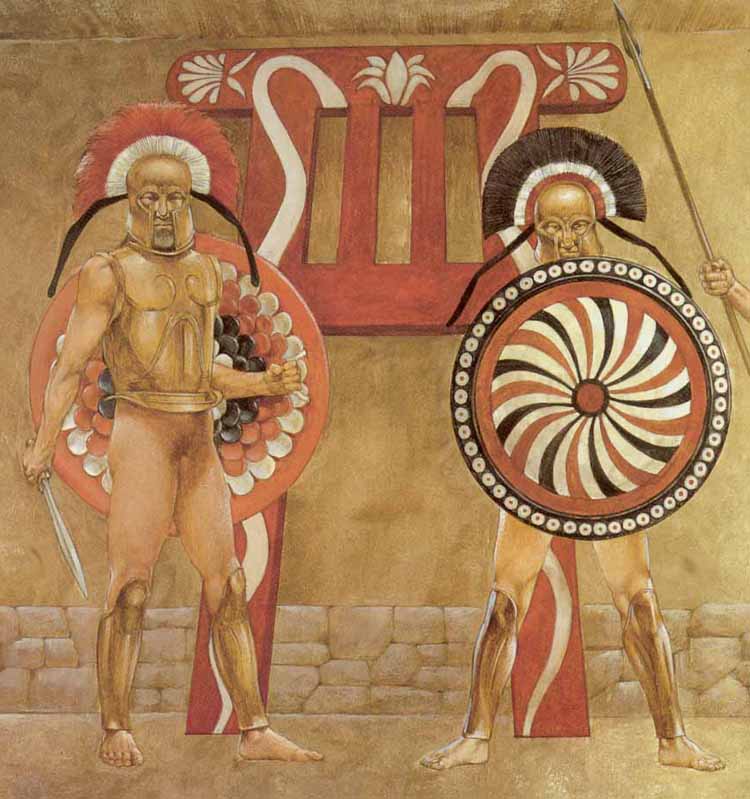
Spartan Kings
Agesipolis ruled from 395 to his death in 380 -- a time of constant war.
Agesilaus, who was born in 444 BC, ruled from 399 to 360, and died while on campaign in Egypt at the age of 84.
These guys made war, under very rough conditions, throughout their lives.
That's what all Spartiatai, and particularly the Spartan kings, were expected to do.
And when they weren't making war, they were at home in Sparta, spending time with their wives and children;
wrestling and engaging in other Fight Sports like boxing, as well as other athletic activity, with other Men;
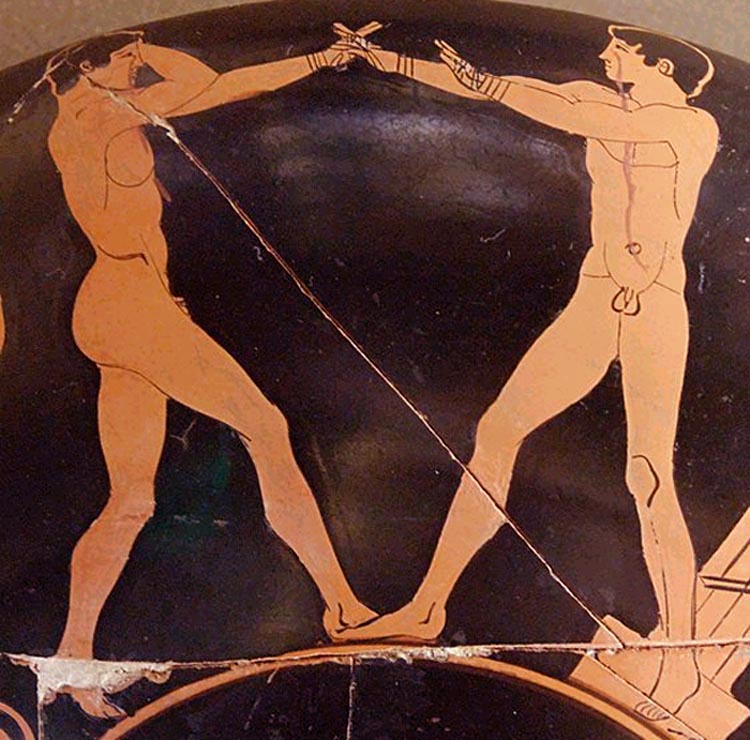
Boxing, which the Spartans were said to have invented, was particularly popular at Sparta
training and drilling for war with other Men;
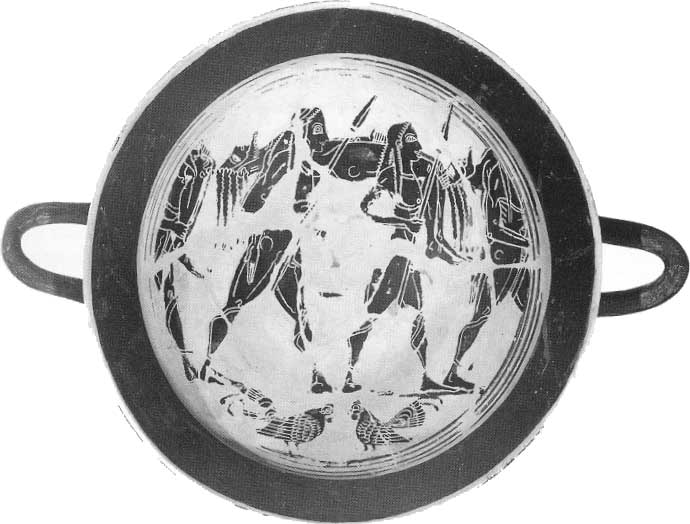
hunting with other Men;
supervising the boys in the Agogé with other Men; and,
messing with other Men -- under Spartan law the Men *had* to take their meals in common -- that was a major part of the Spartan program of austerity and equality.
And they had male lovers as well -- boyfriends -- which started, according to Plutarch, when they were in the Agogé.
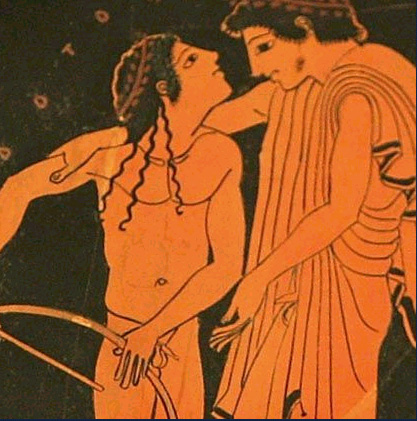
And which continued after they were married -- at the age of thirty.
And I'm going to address this in more depth in Part II of Two Spearmen.
For now, let me give you one more anecdote about Agesilaus, going back to the period when he was campaigning in Persian territory.
Towards the end of that time, he entered into a truce with the Persian satrap Pharnabazus.
And during those negotiations, he met Pharnabazus' son, who made a very good impression upon him.
In fact, the two, Agesilaus and the son, exchanged gifts in a way which made them officially friends.
Later, that son was forced into exile -- in Greece -- by his brother.
Xenophon:
Then Agesilaus gave him all the help he could. Among other things was this. The boy had fallen in love with the son of Eualces, an Athenian, and Agesilaus, for his sake, tried his best to get this Athenian, who was much taller than the boys of his age, allowed to enter for the men's 200 yards at Olympia.
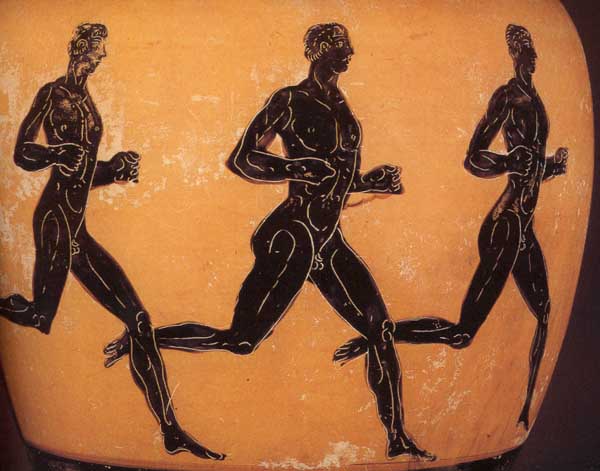
So what you see is Agesilaus using his influence as a Spartan king to help the lover of a friend -- compete in the Olympics.
And his doing that would have quickly become public knowledge.
Xenophon mentions this sort of thing very casually.
And we have to remember that Xenophon is very much a moralist;
that Agesilaus is one of his heroes;
and that he's saying that Agesilaus was doing the right thing by helping a friend's lover.
In other words, Agesilaus' intervention on the tall boy's behalf is a sign of good character.
And with that in mind -- remembering that Xenophon is a moralist and very concerned with character -- let's look at two more anecdotes from the Hellenica involving Spartan commanders, Spartiatai, whom Xenophon would almost certainly have known personally.
In the first, the Spartan commander is named Alcetas, and he's succeeded in seizing some Theban -- enemy -- ships full of grain which Thebes desperately needs, and imprisoning their crews in the Acropolis of a Spartan-controlled city called Oreus.
[The Spartan Alcetas] kept those men, who were at least three hundred in number, in the Acropolis [of Oreus] where he had his own quarters.They say that in Oreus there was a boy who was often with Alcetas. He was a fine attractive boy, and Alcetas used to come down from the Acropolis and spend his time with him.
This carelessness of his was observed by the prisoners, who seized the Acropolis, whereupon the city revolted and, as a result of this, the Thebans could now bring in corn easily.
~translated by Warner
So, in this instance, Xenophon is describing carelessness on the part of the Spartan commander -- not the sort of thing Xenophon would approve of.
Xenophon had been a very successful commander in his own right, and he doesn't hesitate to point out how an officer's laxity will get an army into trouble.
But what he doesn't say is that Alcetas was immoral to be involved with this boy.
To the contrary, he says that the boy "was a fine attractive boy" -- implying that it was natural for Alcetas to be drawn to him and to want to "spend his time with him."
Just as Agesilaus says to Otys that Sphiridates' son is "very good-looking."
So: Alcetas is lax as a commander -- he messes up, and we can be sure he was punished by the Spartans for doing so -- if he wasn't killed by the Thebans first.
But Alcetas is not regarded as immoral or less than a Man because he's involved with "a fine attractive boy" or youth.
That's not in the cards.
The problem is not the boy;
the problem is that Alcetas has put his dalliance with the boy ahead of keeping control of an Acropolis full of enemy soldiers.
In this next anecdote, however, the Spartan commander, a Spartiates or Equal named Anaxibius, makes some mistakes, but ultimately he behaves very well indeed.
Anaxibius is ambitious, and trading on his friendship with the ephors, gets himself appointed governor of an area around the Hellespont.
The Athenians counter by sending out a very capable general named Iphicrates.
Iphicrates plots an ambush against Anaxibius and his men who are returning from a raid, lays in wait, and then attacks when Anaxibius and his forces are in an untenable position:
It was at this moment that Iphicrates let his men out of the ambush and charged towards Anaxibius at the double.Anaxibius saw that his position was hopeless. ... He saw too that the sight of the ambush had put everyone into a state of terror, and he said to the men with him: 'My friends, the only honourable thing for me to do is to die here. As for you, try to get away as fast as you can before the enemy are on us.'
After these words, he took his shield from the man who was carrying it and fell fighting where he stood. But the young man with whom he was in love stayed by him, and so did about twelve of the Spartan governors who had come to join him from their cities. All of these fought and died with him.
The rest of his men took to flight and were cut down fleeing. [Iphicrates killed] about two hundred of the rest of the army and about fifty of the [Spartan-allied] hoplites. ...
~translated by Warner
So -- what we have here is another Spartan commander who'd been somewhat lax -- he let himself and his men get ambushed after all -- and who'd also, Xenophon tells us a bit earlier, ignored and treated with contempt sacrifices which "did not come out well."
That's impiety, and to Xenophon that's another huge fault in a commander -- or any human being.
But -- Anaxibius redeems himself in Xenophon's -- and his readers' -- eyes, by doing the right thing, and fighting and dying in battle, while trying to give his men time to get away.
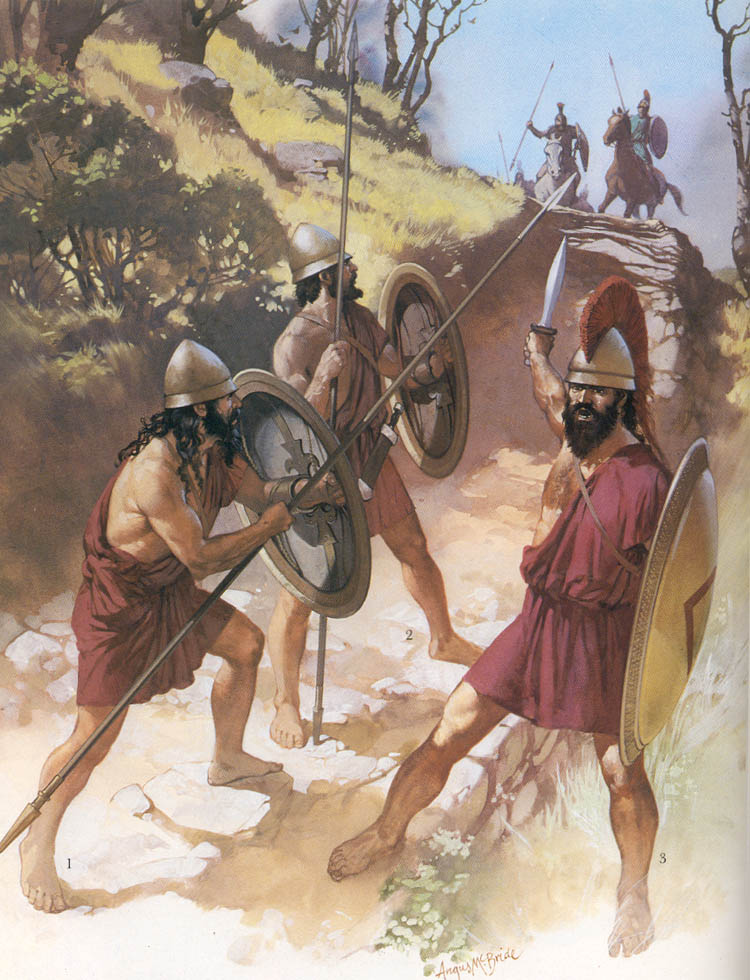
Moreover, "the young man with whom he was in love stayed by him, and so did about twelve of the Spartan governors who had come to join him from their cities. All of these fought and died with him."
That's noble, virtuous, and valorous behavior, and it's what a Spartan is supposed to do.
And, in the ancient Greek and Spartan scheme of things, "the young man with whom he was in love" would be considered particularly valorous, because he stayed by and died for his lover.
This is what the character named Phaedrus says, in Plato's Symposium, about Achilles, the greatest mythic hero of the ancient world, doing the same:
The Gods honoured Achilles, son of Thetis, and sent him to his place in the Isles of the Blest, because having learnt from his mother that he would die as surely as he slew Hector, but if he slew him not would return home and end his days as an aged man, he bravely chose to go and rescue his lover Patroclus, avenged him, and sought death not merely in his behalf but in haste to be joined with him whom death had taken. For this the Gods so highly admired him that they gave him distinguished honor, since he set so high a value on his lover. ... For in truth there is no sort of valour more respected by the Gods than this which comes of love. ...
"For this the Gods so highly admired him that they gave him distinguished honor, since he set so high a value on his lover. ... For in truth there is no sort of valour more respected by the Gods than this which comes of love. ..."
Would "the young man Anaxibius was in love with" have known the story of Achilles and Patroclus?
Absolutely!
It's in Homer -- Homer was the Bible of the Greeks -- and the bit about the Isles of the Blest is in Pindar, and was no doubt elsewhere in the ancient literature too.
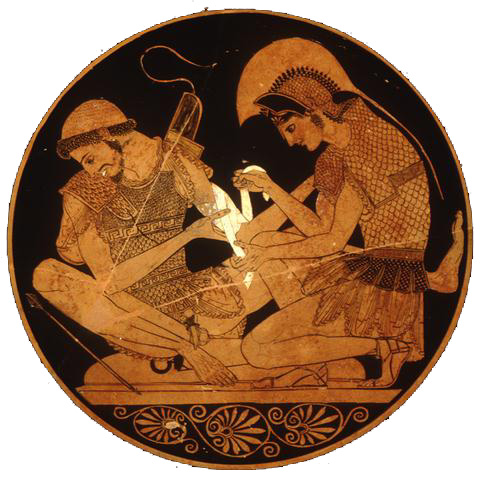
Patroclus and Achilles
And as I explain in Mythic Identification and the Warrior Bond, Men in the ancient world identified with and very consciously modeled their behavior on that of Gods and Heroes like Achilles.
And, in addition, this was part of the Spartan code -- never retreat, never surrender.
But, most importantly, in this instance, the young man would have been taught, in the Agogé, that "there is no sort of valour more respected by the Gods than this which comes of Love."
And of course their word for Love is Eros -- Manly Love.
So -- Anaxibius' lover did the right thing, and more than the right thing.

His behavior was sterling.
And you'll notice that the guys who ran away got killed anyway.
To Xenophon -- as to most ancient thinkers -- you were far better off staying and fighting, than you were in running.
So -- what you see is a culture in which male-male Love -- Eros -- is common and taken for granted.
And celebrated.
And exalted:
There is no sort of Valour more respected by the Gods than this which comes of Love.
And in the original Greek, the word for Valour is Areté -- which derives from Ares; and the word for Love, as I said, is Eros.
Who just happens to be the son of Ares.


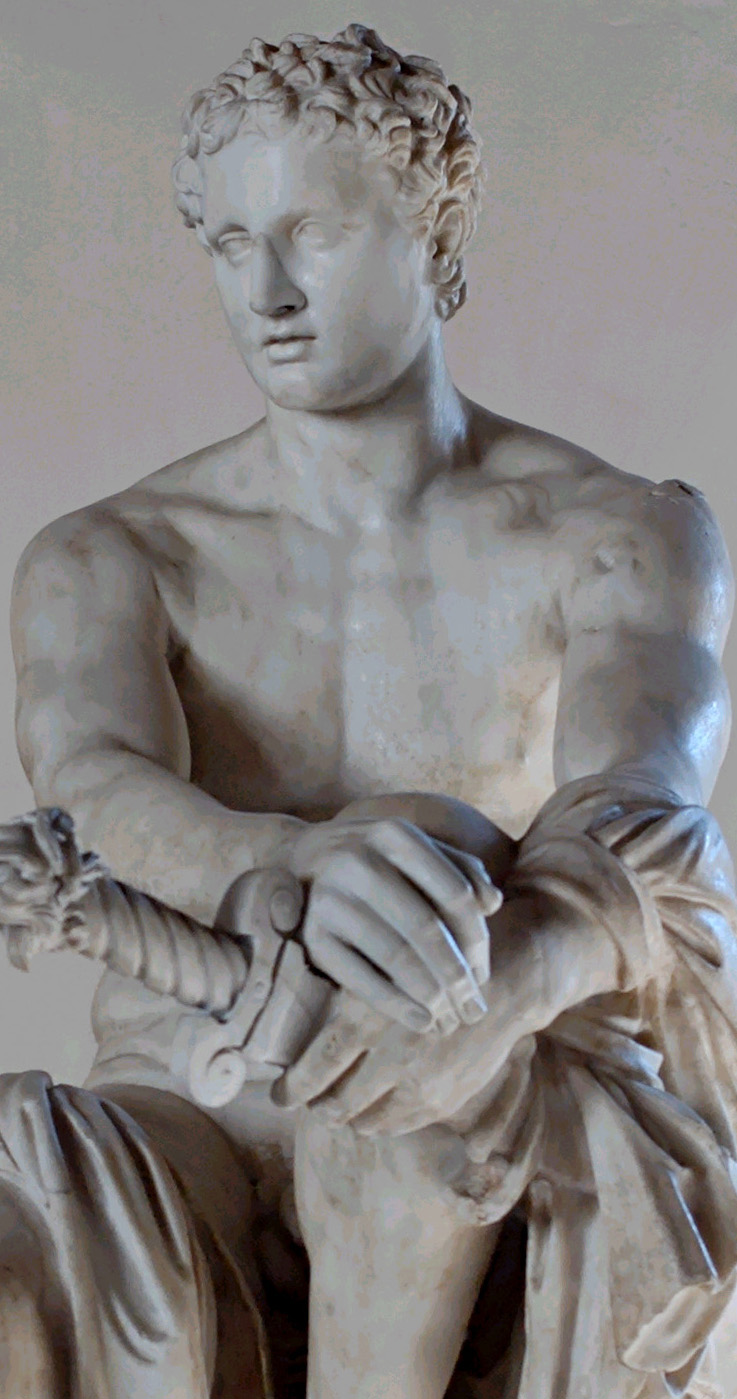

This is a Martial culture and a Masculine culture.
In which all Men are expected to be at arms and at war for significant periods of time in their lives.
Male-male Love -- Eros -- is core to that culture.
There is no sort of Valour more respected by the Gods than this which comes of Love.

Same-sex Love, Male-Male Love, EROS.

So far as we can tell, all Men engaged in it.
It was public.
And it was an activity.
Not a condition.
So long as there was no anal -- there was no problem.
And of course the Men were not supposed to be promiscuous.
Now, it does appear that Agesilaus had more than one boyfriend over the years.
But that was done serially.
What you don't see is what's common among gay-identified males today -- concurrency, in which the males have multiple partners at the same time.
That would have been unthinkable to an archaic or classical Greek.
And in the case of Agesilaus, the fact is that his first lover, Lysander, was ambitious.
And devious.
In a way that Plutarch clearly considers unworthy of a Spartan.
His deviousness served him -- and Sparta -- well in that it led to the Spartan victory in the Peloponnesian War.
And afterwards, Lysander used his influence to make sure that Agesilaus became king.
But then Lysander attempted to use his relationship with Agesilaus to his own political advantage, and in a way which Agesilaus and others thought was demeaning to Agesilaus.
So Agesilaus, in effect, sent him packing.
Not long thereafter, Lysander was killed in battle, and it was quietly revealed that Lysander been plotting a coup against the royal houses of Sparta.
And I think that must have been very difficult for Agesilaus.
Lysander was killed in 395 -- and Agesilaus was no longer a young man.
But what happened had to have been painful for Agesilaus.
Nevertheless, Xenophon's Hellenica shows us, as do many of the Platonic dialogues, how commonplace male Eros was among the Men of ancient Greece.
Including in the Greek city-states in Persian territory -- in what is now the Middle East.
Where, it would appear, sex between men, and male-male love affairs, remain common -- and unremarkable -- to this day.
Unremarkable, that is, to the people who live there.
Redd:
the lecturer suggested that because Arabs knew about Arab men's man2man, no one thought much of it or did not see man2man negatively or as men acting like women....
He cited a Muslim intellecutal who rejected "gay" to describe man2man in Arab cultures, saying that homosexual experiences in Arab cultures happened, which most people in those respective cultures knew, but the men usually married.
"The men usually married" -- as they did in ancient Greece.
Yet contemporary Westerners, like the guy who interviewed Gore Vidal, have a very hard time with the notion that man2man is -- NORMAL.
And yet it clearly was in ancient Greece and is today in places like Lebanon.
When Gore Vidal, as he has throughout his life, insists upon not being put into the "gay" box -- the interviewer, a guy named Johann Hari, objects, and suggests to the reader that like Vidal's critique of America, this is some sort of weirdness on Vidal's part.
Yet Mr Hari also tells us that Vidal "warned against every war from Vietnam to Iraq, often with extraordinary prescience."
Isn't it possible that Vidal is prescient on this little question of sexual orientation too?
No -- no way the interviewer will go there.
But in this matter, both history and anthropology -- not to mention ethology, the study of animal behavior -- are all on Vidal's side.
And ours too.
Once again I thank Redd for this and his many other excellent posts.
Redd is a true Warrior.
Bill Weintraub
February 2, 2010

© All material Copyright 2010 by Bill Weintraub. All rights reserved.
Related articles:
Sex Between Men: An Activity, Not a Condition


who reject anal penetration, promiscuity, and effeminacy and
who put forth the truth that one Man should love Another
among men who have sex with men
through the exaltation of their Mutual Manhood;
and the celebration of their Mutual Masculinity.

xxxxThis aspect of our work is the one that's most disturbing and indeed frightening to our opponents:
xxxx
That we combine the Love of Man with the Love of Fighting Spirit.
xxxx
Which is Warrior Spirit.
xxxx
The Warrior God is the Guardian of that Spirit.
xxxx
You may call him Jesus Christ as Robert Loring does.
xxxx
You may call him Ares as did the Greeks.
xxxx
What's important is that you understand and acknowledge
xxxx
the vital role He plays in Your Life.






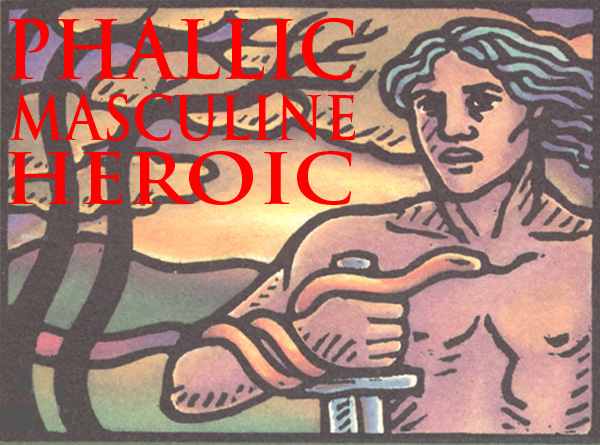



AND


Warriors Speak is presented by The Man2Man Alliance, an organization of men into Frot
To learn more about Frot, ck out What's Hot About Frot
Or visit our FAQs page.

| Heroes Site Guide | Toward a New Concept of M2M | What Sex Is |In Search of an Heroic Friend | Masculinity and Spirit |
| Jocks and Cocks | Gilgamesh | The Greeks | Hoplites! | The Warrior Bond | Nude Combat | Phallic, Masculine, Heroic | Reading |
| Heroic Homosex Home | Cockrub Warriors Home | Heroes Home | Story of Bill and Brett Home | Frot Club Home |
| Definitions | FAQs | Join Us | Contact Us | Tell Your Story |

© All material on this site Copyright 2001 - 2010 by Bill Weintraub. All rights reserved.















